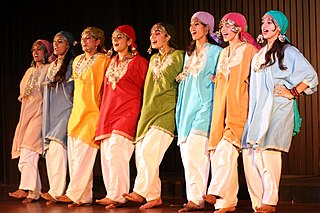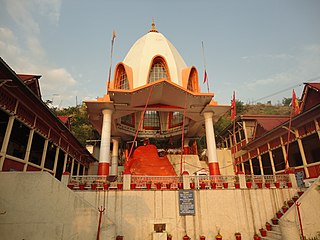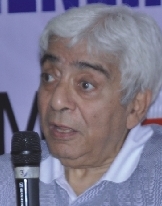Related Research Articles

The Kashmiri Pandits are a group of Kashmiri Hindus and a part of the larger Saraswat Brahmin community of India. They belong to the Pancha Gauda Brahmin group from the Kashmir Valley, located within the Indian union territory of Jammu and Kashmir. Kashmiri Pandits are Hindu Kashmiris native to the Kashmir Valley, and the only remaining Hindu Kashmiris after the large-scale of conversion of the Valley's population to Islam during the medieval times. Prompted by the growth of Islamic militancy in the valley, large numbers left in the exodus of the 1990s. Even so, small numbers remain.

The Kashmir conflict is a territorial conflict over the Kashmir region, primarily between India and Pakistan, and also between China and India in the northeastern portion of the region. The conflict started after the partition of India in 1947 as both India and Pakistan claimed the entirety of the former princely state of Jammu and Kashmir. It is a dispute over the region that escalated into three wars between India and Pakistan and several other armed skirmishes. India controls approximately 55% of the land area of the region that includes Jammu, the Kashmir Valley, most of Ladakh, the Siachen Glacier, and 70% of its population; Pakistan controls approximately 30% of the land area that includes Azad Kashmir and Gilgit-Baltistan; and China controls the remaining 15% of the land area that includes the Aksai Chin region, the mostly uninhabited Trans-Karakoram Tract, and part of the Demchok sector.

Kashmiris are an Indo-Aryan ethnolinguistic group speaking the Kashmiri language and originating from the Kashmir Valley, which is today located in Indian-administered Jammu and Kashmir.
Dhar is a surname commonly found among the Hindu Bengali Kayastha community in West Bengal, India. Dhar or Dar is also used by some Kashmiri clans and communities native to the Kashmir Valley in Jammu and Kashmir, India, and common today among Kashmiri Hindus and Kashmiri Muslims.
Zinda Kaul (1884–1965) was an Indian poet, writer and teacher. He composed in Persian, Hindi, Urdu and Kashmiri. Kaul also translated works of Kashmiri into English, Persian and Hindi.

Panun Kashmir is a proposed union territory of India in the Kashmir Valley, which is intended to be a homeland for Kashmiri Hindus. The demand arose after the Exodus of Kashmiri Hindus in 1990. The vision of the homeland was elucidated in the Margdarshan Resolution of 1991. Panun Kashmir is also the name of an eponymously named organization.

Kashmiri Muslims are ethnic Kashmiris who practice Islam and are native to the Kashmir Valley of Indian-administered Jammu and Kashmir. The majority of Kashmiri Muslims are Sunni, while Shias form a minority. They refer to themselves as "Koshur" in the Kashmiri language.
On 26 May 2008, the government of India and the state Government of Jammu and Kashmir reached an agreement to transfer 99 acres (0.40 km2) of forest land to the Shri Amarnathji Shrine Board (SASB) in the main Kashmir Valley to set up temporary shelters and facilities for Hindu pilgrims to Amarnath Temple. This caused a controversy, with demonstrations from the Kashmir valley against the land transfer and protests from the Jammu region supporting it. The largest demonstration saw more than 500,000 protesters at a single rally, among the largest in Kashmir's history.
The Kashmiri diaspora refers to Kashmiris who have migrated out of the Kashmir into other areas and countries, and their descendants.

The culture of Kashmir encompasses the spoken language, written literature, cuisine, architecture, traditions, and history of the Kashmiri people native to the northern part of the Indian subcontinent. The culture of Kashmir was influenced by the Persian as well as Central Asian cultures after the Islamic rule of Kashmir. Kashmiri culture is influenced by Hinduism, Buddhism and later by Islam.
Human rights abuses in Jammu and Kashmir range from mass killings, enforced disappearances, torture, rape and sexual abuse to political repression and suppression of freedom of speech. The Indian Army, Central Reserve Police Force (CRPF), and Border Security Personnel (BSF) have been accused of committing severe human rights abuses against Kashmiri civilians. According to Seema Kazi, militant groups have also been held responsible for similar crimes, but the vast majority of abuses have been perpetrated by the armed forces of the Indian government.
Human rights abuses in Kashmir have been perpetrated by various belligerents in the territories controlled by both India and Pakistan since the two countries' conflict over the region began with their first war in 1947–1948, shortly after the partition of British India. The organized breaches of fundamental human rights in Kashmir are tied to the contested territorial status of the region, over which India and Pakistan have fought multiple wars. More specifically, the issue pertains to abuses committed in Indian-administered Kashmir and in Pakistani-administered Kashmir.

Kashmiri Hindus are ethnic Kashmiris who practice Hinduism and are native to the Kashmir Valley of India. With respect to their contributions to Indian philosophy, Kashmiri Hindus developed the tradition of Kashmiri Shaivism. After their exodus from the Kashmir Valley in the wake of the Kashmir insurgency in the 1990s, most Kashmiri Hindus are now settled in the Jammu division of Jammu and Kashmir and other parts of the country. The largest group of Kashmiri Hindus are the Kashmiri Pandits.

Dr Nirmal Kumar Singh is an Indian politician and was the last Speaker of the Jammu and Kashmir Legislative Assembly of the erstwhile Jammu and Kashmir State. He is a former Deputy Chief Minister of Jammu and Kashmir. He is a leader of Bharatiya Janata Party. On 1 March 2015, he assumed the charge of the Minister for Power Development and Housing and Urban Development.

The Exodus of Kashmiri Hindus, or Pandits, is their early-1990 migration, or flight, from the Muslim-majority Kashmir valley in Indian-administered Kashmir following rising violence in an insurgency. Of a total Pandit population of 120,000–140,000 some 90,000–100,000 left the valley or felt compelled to leave by the middle of 1990, by which time about 30–80 of them are said to have been killed by militants.
Peacebuilding in Jammu and Kashmir includes confidence-building measures at a nation-state level between the governments of India and Pakistan, track two diplomacy, as well as initiatives by non-governmental organisations (NGOs), institutes and individuals. The purpose of peacebuilding in Jammu and Kashmir include conflict prevention and reduction of hostilities in the Kashmir Valley. Many countries such as Russia, United States and China have also played a de-escalatory role with regard to tensions in the region.

Maharaj Krishen Kaw was an Indian bureaucrat and author who served as Secretary, Civil Aviation and Secretary, Ministry of Human Resource Development. An officer of the 1964 batch of the Indian Administrative Service, he served in numerous positions in the government of Himachal Pradesh and the Government of India.

The Kashmir Files is a 2022 Indian Hindi-language drama film written and directed by Vivek Agnihotri. The film presents a fictional storyline centred around the 1990 exodus of Kashmiri Hindus from Indian-administered Kashmir. It depicts the exodus and the events leading up to it as a genocide, a framing considered inaccurate by scholars. The film claims that such facts were suppressed by a conspiracy of silence.
References
- ↑ "Kashmiri Samiti, Delhi. A brief history". partitionofindia.com. 8 December 2004. Retrieved 20 August 2012.
- ↑ "All India Kashmiri Samaj demands Political space for Kashmiri Pandits". Jammu: dnaindia.com. 11 January 2011. Retrieved 20 August 2012.
- ↑ "All India Kashmiri Samaj presents Memorandum to Governor". Kashmir Images. 7 August 2012. Archived from the original on 10 April 2013. Retrieved 20 August 2012.
- ↑ "All India Kashmiri Samaj accuses Centre, J&K State Government of being insensitive". The Times of India . Chandigarh. 4 November 2012. Archived from the original on 11 April 2013. Retrieved 29 December 2012.